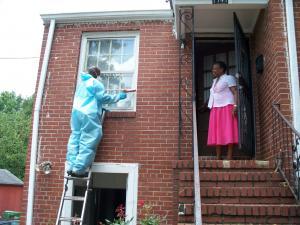
Section Branding
Header Content
Federal Money Helps Georgians Save Energy, Creates Jobs
Primary Content

Four workers walk around the red bricked one story home in a low income Atlanta neighborhood. They’re caulking windows, crawling beneath sinks, behind a washer and dryer, sealing up the cracks.
Sixty-eight year old Brenda Watts is the home’s owner, and she’s glad to have them.
“I'm on a very tight budget and so everything is getting high, the water, the electricity,” says Watts. “And I wonder how am I going to do this. I can't do this.”
Watts' home is being retrofitted to save energy. The former secretary and retired bus driver has lived here over twenty years. She lives on a fixed income. And thanks to a federal stimulus program she doesn’t have to pay a dime for the upgrade. But she’s still curious how much it costs… and asks the crew’s chief Benson Johnson.
Watts: How much would I have to pay if I had to do this on my own.
Benson: Well, for the overall job including time and labor you would probably have paid anywhere from $8,000-10,000.
Watts: Oh my goodness. I'd have to go back to work. Good bye retirement.
The demand for this service is high. “Currently the waiting list is at 7,000 to 8,000 that have applied to the community action list and have been approved,” says Shane Hix with the Georgia Environmental Facilities Authority--the state agency overseeing the program.
He says even though the program will see $124 million federal stimulus boost over the next three years, they still won’t have enough money to serve everyone who wants an energy upgrade.
“Even with the increases in federal funds there will still be more demand than resources available through the stimulus funds,” says Hix.
The federal money isn’t only to help poor people cut energy costs while helping the country curb its carbon foot print… its intent is to put people to work. Over the next three years, officials estimate it will create 4,000 jobs in Georgia.
In the work crew on this day, one is a new hire. Benson Johnson says his agency expects to employ 15 -20 more. They’re just waiting for the money to come down the pipe.
“Within the past five months I've interviewed 25 applicants,” says Johnson. “I've already picked out the applicants I want to start hiring. Only thing I’m waiting for is word from my executive director that it's a go.”
State officials say the state will release the federal money to local agencies in early August.
Until then, Ms. Watts says she'll be passing the word on to her friends--being sure to mention the side perk that comes with sealing up your home.
Watts: Right about this time of year, I start seeing those big bugs, so every year at this time I have to get the spray b/c they're coming.
Reporter (Stiers): I hear this is going to cut down on bugs too.
Watts: Good because those things are scary.
The service is only available for single family homes. To qualify a family of four can’t make more than $44,000 a year.
Click here for more information.
Tags: weatherization, energy efficient, Southeast Energy Assistance, Georgia Environmental Facilities Authority, Shane Hix, Benson Johnson, Brenda Watts, federal stimulus dollars
